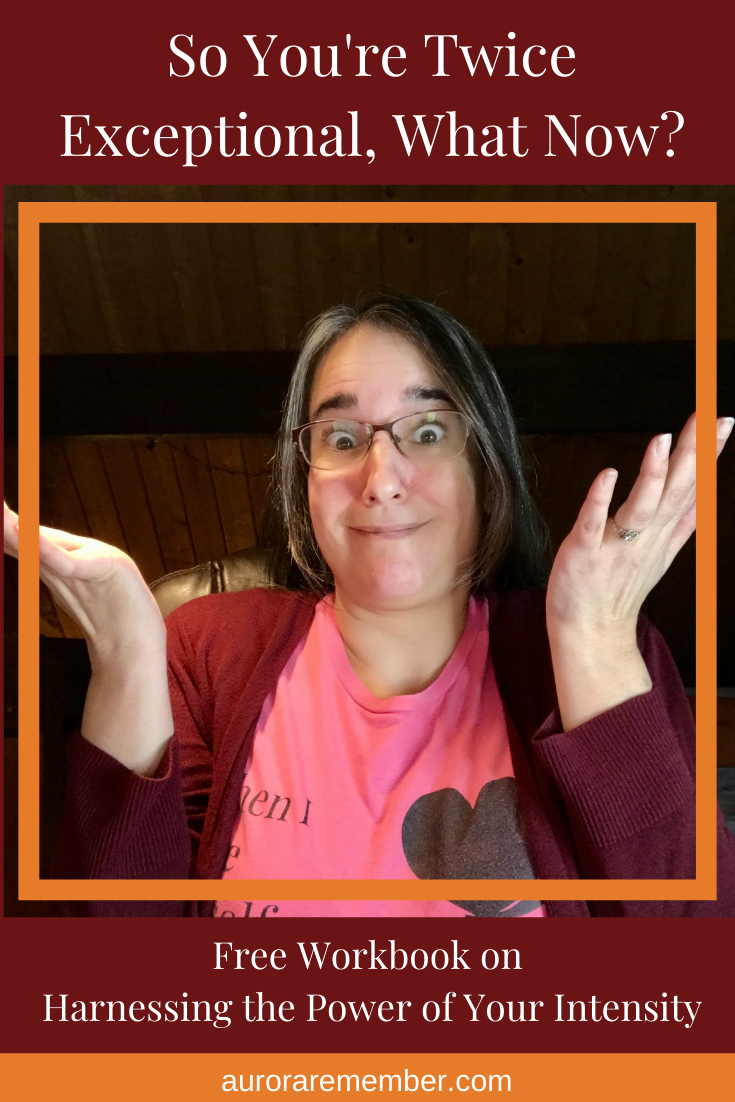I’ve been getting a lot more questions from folks who realized they are or might be twice exceptional lately, and after this TikTok post – Put a Finger Down: Twice Exceptional Edition blew up the last few days, the most common question was, “This is me! What now?” I started by collecting my posts etc. on twice exceptionality here on one place here, though I may have to go through and tag more that might be relevant. These will be evolving pages and I’l be adding more resources as I go.

If you’re not familiar with the term, twice exceptionality is an educational term used for people who are both gifted and have a disability (or more than one) that impacts their learning, executive functioning etc. I wrote about it more in this post on What Exactly is Twice Exceptionality? which also includes some great resources on the topic. The challenge of growing up twice exceptional is what inspired me to go into school psychology, but I started to notice a severe lack of resources for this in adults so I started focusing on it in my work the last couple of years. I started sharing stories of many Twice Exceptional folks I’ve interviewed on my Embracing Intensity Podcast through my Embracing Intensity Shorts animated videos here.
When I looked at the question of “I think I’m Twice Exceptional, what now?” 3 main themes came up:
-
Identify your strengths and how you can use them.
-
Manage your self expectations by focusing on self-regulation supports (making things easier for yourself) rather than self-control (forcing yourself).
-
Find other who “get it” and possibly have complementary strengths.
Identify your strengths. It can often be easier to focus on our challenges rather than our strengths, but when we focus on our strengths we can find ways to use them in a positive way instead of pushing against our weaknesses. If your having a hard time identifying your strengths, there are some great self-assessment tools you can start with:
One I have used in educational assessment for nearly 20 years (the website design hasn’t changed, but the tools have been updated) is called the Cognitive Processing Inventory. It has a self-rating that you can do to look at your processing strengths and challenges and gives recommendations. They are geared toward school but most can easily be applied toward work etc. It looks at most of the areas I discuss in this post on Understanding Your Brain.
In my free workbook on Harnessing the Power of Your Intensity, there’s an excitability checklist that looks at the 5 areas of intensity, many of which can often be associated with twice exceptionality. The 5 areas include Intellectual, Imaginative, Emotional, Sensory and Psychomotor. Then it explores how you can channel your areas of intensity in a positive way.
I also got a lot of great information from the VIA Survey of Character Strengths on the Authentic Happiness Questionnaire Center (there are a lot of other interesting looking ones, but I’ve not done them)
I will plan to collect some more self-assessment tools and share in a future post, so if you know of any good ones, feel free to comment.
Manage your self-expectations. For a lot of us with learning challenges and/or executive dysfunction who have gotten by, we’ve relied on strategies that force ourselves to do things in a way we think they are supposed to be done. Sometimes we may be successful, but this can lead to a lot of stress and even stress related health issues.
In the last few years, I’ve focused on exploring ways to make things easier on myself rather than relying on force of will which had led to chronic pain and fatigue. I gathered much of what I’ve learned into my Ignite Your Power Course and Workbook Series which can be found in my Embracing Intensity Community. You can get the first workbook on Harnessing the Power of Your Intensity free here.
When you can identify your strengths and how to use them, and set up supports in place to help accommodate your challenges, you can figure out what works for YOU instead of what you or others think you should do.
Find other who “get it.” Finally, and most importantly, it is crucial to connect with people who “get” you, whether that’s friends, community or professional support. It is especially helpful if you can find friends or partners who have complementary strengths. As one friend once told me, we tend to under value our own skills and over value those of others. Having people who can appreciate and reflect back your strengths can help immensely.
Finding professionals who “get it” can also be a challenge. I’m exploring this topic more so I can do it justice, but there is a list from SENG (Supporting the Emotional Needs of the Gifted) of Mental Health Providers who are familiar with giftedness here that might be a good place to start. The important thing when talking to professionals is that they understand that even if someone is achieving on the outside, does not mean they don’t have challenges that impact them significantly.
Moving forward, I’d love to continue collecting resources that would be useful for twice exceptional adults & teens, so if you have any to share, feel free to leave them in the comments!

Roberta J Brown
I think my brother, Jay, was twice exceptional. He had no social skills but he was very social. He was very intelligent but wasn’t analytical. I thought maybe he had some type of autism.